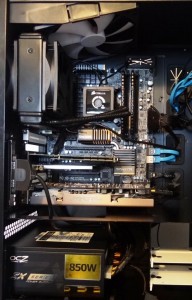BENCHMARK PROTOCOL AND THE TEST BENCH
 This is The SSD Review Test Bench Number One. A quick click on the photo will give you a better look.
This is The SSD Review Test Bench Number One. A quick click on the photo will give you a better look.
In testing, our main objective is to obtain results as pure and as accurate as possible and we want to ensure that no anomalies slip through. Simply put, we want to provide you with the absolute best results the tested hardware can provide. Repetition in testing is standard and, if necessary, we may conduct specific tests in Windows 7 safe mode to ensure the OS has little to no influence on the end result.
In order to validate and confirm our findings, testing is supported by industry accepted benchmark programs. All results are displayed through capture of the actual benchmark for better understanding of the testing process by the reader.
 We would like to thank Gigabyte, Corsair, MSI, OCZ, Fractal-Design, and Icy Dock for sponsoring components of our Test Bench.
We would like to thank Gigabyte, Corsair, MSI, OCZ, Fractal-Design, and Icy Dock for sponsoring components of our Test Bench.
SSD COMPRESSION AND TESTING FLUCTUATIONS
All SSDs are not created equal and many new SSD enthusiasts realize that when they test their new drive to confirm specifications and ensure all is in order. SandForce controlled SSDs use compression techniques in storage whereas many others do not. This creates a bit of confusion when enthusiasts test the drive with random data through benchmarking programs such as AS SSD and Crystal Diskmark (random data sample). The results seem to be lower than the listed specifications.
The results actually present a false portrayal of the drives ability when compared to other drives such as the Samsung 470 Series and Crucial M4 SSDs that we have reviewed previously. It is for this reason that all of our comparison testing is done through PCMark Vantage. PCMark Vantage HDD Suite simply provides evaluation results based on transfer speeds reached through typical user patterns. Vantage provides a better testing medium, in that, it sees through the typical synthetic benchmarks and provides us with true to life results of the drive.
BENCHMARK SOFTWARE
Software used for testing by The SSD Review consists of Crystal DiskMark, ATTO Benchmark, AS SSD, Anvil Storage Utilities, HDTune Pro along with FutureMark PCMark Vantage.
All do a great job of showing us the numbers that we want to see, or dont want to see in some cases, while PCMark Vantage x64 is an excellent program which recreates tests that mimic the average users activity, all the while providing a medium to measure each.
ATTO Disk Benchmark is perhaps one of the oldest benchmarks going and is definitely the main staple for manufacturer performance specifications. ATTO uses RAW or compressible data and, for our benchmarks, we use a set length of 256mb and test both the read and write performance of various transfer sizes ranging from 0.5 to 8192kb. Manufacturers prefer this method of testing as it deals with raw (compressible) data rather than random (includes incompressible data) which, although more realistic, results in lower performance results.
Our ATTO testing provided high sequential disk access results of 557MB/s read and 504MB/s write which aren’t that far off the mark at all. Speeds such as this can only be the result of a SandForce SF-2281 processor.
 The SSD Review The Worlds Dedicated SSD Education and Review Resource |
The SSD Review The Worlds Dedicated SSD Education and Review Resource | 
On what FW-Version hast this test been done?
The firmware version identified through CDM is 1.3
I have this drive, performance is good, only issue I have is the connector design, its held by 2 small pins and is not secure compared to my ocz
I have this drive and the cable connector in the caddy broke. I’m considering using a cabling to connect direct now instead, but can’t determine the voltage of this unit… any ideas please? Lindy do a nice unit…
im currently thinking on buying this one, anything in it’s price range that i should be comparing to?
NO…this is a great SSD.
I am more curious when the price for a 250GB+ SSD will be less than $100.
I would want something like this Corsair 240 GB SSD Force serie GT or the Samsung 850 EVO or PRO. But if you want to get a normal capacity for your system, then anything less that 200GB is no good.
Black Friday sales today show several SSDs at the range. Happy shopping and use our links!